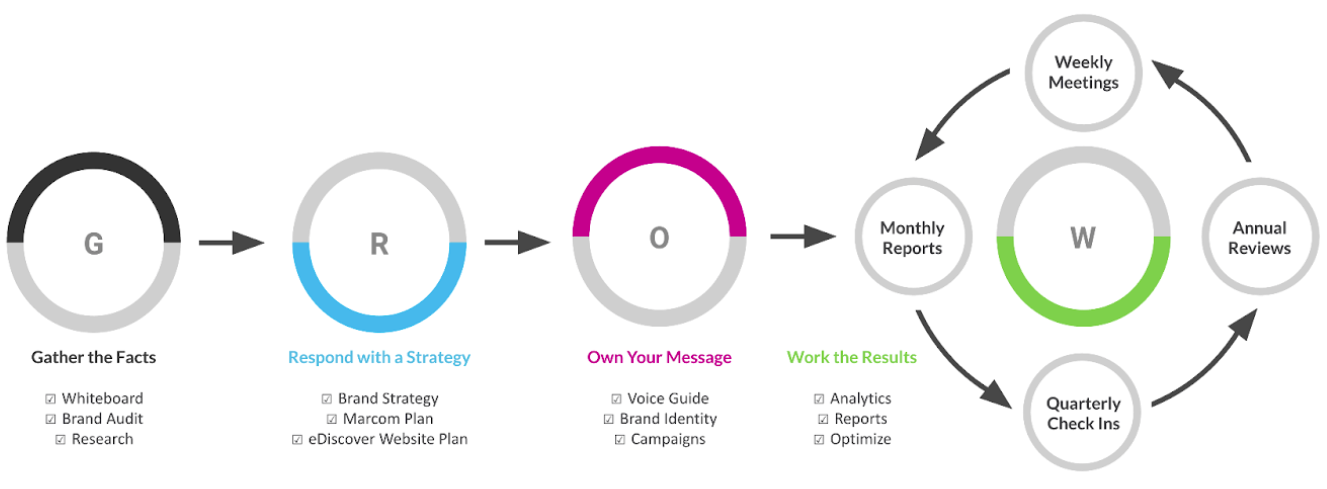A marketing budget without a plan is as incomplete as a plan that has no funding. While the former scenario is no doubt preferable to the latter, the ideal approach involves developing a strategic plan that outlines how much you’ll spend on specific marketing strategies and tactics designed to achieve your objectives.
Many clients ask us how much they should expect to budget for marketing that will achieve measurable goals. But before we get to the answers, let’s address a question some folks may hear from their CEO or CFO at budget time.
Why Market, Anyway?
To paraphrase Henry Ford, a brand that stops advertising to save money is like a person who stops a clock to save time. Businesses that consistently commit to marketing during difficult times, such as recessions (and pandemics), can achieve significant growth. For example, companies that continued marketing during the 1981-82 recession saw a 2.5x increase in sales over competitors that pulled back or stopped their marketing completely.
Marketing achieves a number of goals, helping your organization:
- build brand awareness
- communicate information
- promote products, services, and events
- educate your audience
- engage customers and prospects
- generate high-quality leads
Bottom line: marketing is an investment, not an expense.
Two Ways to Set Your Marketing Budget
How much should you spend on marketing? If you have an established marketing communication (marcom) plan that’s achieving your goals, you can fine-tune it and use the previous year’s expenses as a baseline. Without prior-year data to work with, you might choose to set a budget as a percentage of projected revenue. If you’ve already put together a strategic marcom plan, determine the estimated cost of implementing the plan’s tactics. At Revel we typically use a combination of the two approaches by 1) using a percentage of sales as a guideline and 2) determining the budget required to accomplish your marketing goals.
Approach #1: Marketing by Percentage of Sales
The U.S. Small Business Administration recommends spending 7 to 8 percent of your gross revenue on marketing if you’re doing less than $5 million a year in sales. (After all expenses, this figure is typically in the 10 to 12 percent range.)
That’s nice in theory, but the reality is most businesses don’t spend that much. We believe in the 3-5% Rule. If your business has $1,000,000 in annual revenue, we recommend investing $30,000-$50,000 in marketing each year.
Approach #2: Marketing by Objectives
The other approach for setting a marketing budget is by establishing objectives and estimating the costs to achieve them. Determine what you’d like to accomplish and the strategies and tactics you’ll use to achieve your goals. Then, put a price tag on each tactic. This is the most common way to establish a marketing budget. Of course, it doesn’t hurt to start with a rough number, such as 8 percent of revenue, so you have parameters for determining the specifics of your plan.
Put It In Writing
Written goals help achieve buy-in, keep all team members on the same page, and are far more likely to be achieved. In fact, marketers with a documented strategy are 313% more likely to report success, according to coschedule.com. We use the GROW process for ourselves and our clients, putting marketing objectives, strategies, and budgets in writing and ultimately into action.

Help is Here
At Revel, we’ve proven time and again that a well-constructed strategic marcom plan maximizes our clients’ marketing budgets to meet their broader business goals. If you’re looking for a hand with getting your budget and plan together, we’ve got you covered. Download our ebook, 10 Steps Every Manufacturer’s Marketing Plan Should Include, drop us a line, or give us a shout at (231) 727-9778.










